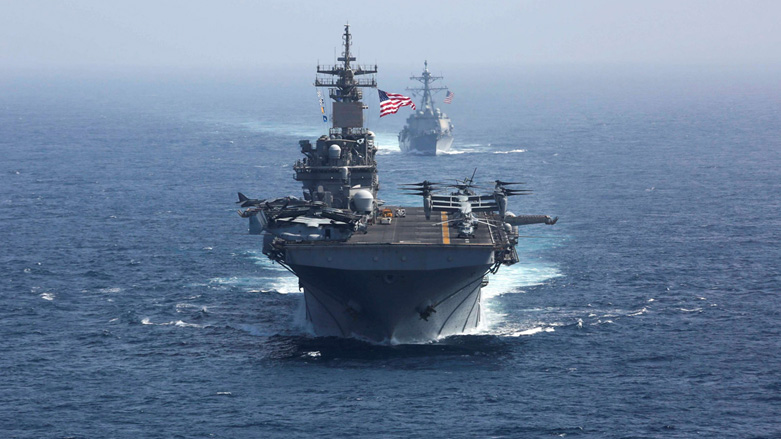US prepares initiative to protect Gulf shipping as UK begins its own patrols

WASHINGTON DC (Kurdistan 24) — US Central Command (CENTCOM) hosted “senior representatives from allies and partner nations” at its headquarters in Florida to discuss a new US initiative to provide security for regional shipping, CENTCOM announced on Thursday.
Although Europe may be developing its own initiative, US officials suggested that it would pose little problem, as there would be coordination between the two efforts.
Operation Sentinel, as the US initiative is called, “is designed to enhance maritime domain awareness and promote maritime stability in response to recent events in the Arabian Gulf region,” a CENTCOM statement explained.
Operation Sentinel was conceived following Iranian attacks on shipping in and around the strategic Strait of Hormuz, through which 20 percent of the world’s petroleum passes.
In May, four ships anchored off the emirate of Fujairah were damaged by limpet mines, and US officials charged Iran with responsibility.
READ MORE: US team suggests Iran behind ship sabotage
On June 27, at a meeting of NATO Defense Ministers in Brussels, the US proposed an international force to protect shipping in the area, but France and Germany baulked, concerned they might become entangled in America’s confrontation with Iran, Reuters reported.
On July 19, Iran’s Islamic Revolutionary Guard Corps (IRGC) seized a British-flagged tanker, the Stena Impero, as it transited the Strait of Hormuz. The seizure was in apparent retaliation for Britain’s seizure of an Iranian tanker off the coast of Malta, the Grace I, carrying oil to Syria in violation of European Union (EU) sanctions against the Arab country. Both ships remain impounded, the Iranian tanker, as well as the British-flagged vessel.
On Thursday, as CENTCOM hosted the Operation Sentinel meeting, Britain’s Defense Ministry announced that its Royal Navy had begun to escort British-flagged vessels through the Strait of Hormuz.
That decision was taken under Prime Minister Theresa May, who resigned her post on Wednesday. Rather than join Operation Sentinel, her government opted to work with other European countries.
As Jeremy Hunt, May’s Foreign Secretary, told the British parliament on Monday, “We will now seek to put together a European-led maritime protection mission to support safe passage of both crew and cargo in this vital region.”
The UK decision may have been influenced by the sharp exchange between London and Washington that followed the leak of cables written by Britain’s ambassador to the US, which were extremely critical of President Donald Trump.
The British ambassador was obliged to resign, while Trump lobbed insults at May. However, he lavished praise on Britain’s new Prime Minister, Boris Johnson, and it is possible that Britain’s position may now shift.
Indeed, Dr. Julian Lewis, Chair of the British parliament’s Defense Committee and a supporter of Boris Johnson, noted America’s considerable naval power and advised Britain’s Sky News, “The idea that we should do this in concert” with the EU, “rather than with our US allies,” is “impractical to the point of lunacy.”
Europe’s maritime security initiative does not appear to bother US officials. The new Secretary of Defense, Dr. Mark Esper, told journalists on Wednesday, just three hours after assuming his position, that the European effort would be “complementary” to the US initiative.
“Whether we do” this as “one big group or as subgroups,” as “long as it complements one another,” it will not make a significant difference, Esper suggested.
“There will clearly be coordination between us all” and “CENTCOM will be the coordinating authority,” he continued. Esper added that he would visit CENTCOM next week “to get a briefing on a number of issues.”
Esper’s visit to MacDill Air Force Base, where CENTCOM is headquartered, will be among his first trips—if not his very first trip—outside Washington as Secretary of Defense, underscoring the immediacy of the Pentagon’s concern about developments in CENTCOM’s area of responsibility.
Esper stressed that the combined efforts of the US and Europeans would have two goals: “maintaining freedom of navigation” and “deterring provocative actions from Iran.” He explained that the British seizure of the Iranian tanker, followed by the Iranian seizure of the British-flagged tanker, was the sort of “tit-for-tat” situation that the US sought to avoid.
State Department Spokesperson Morgan Ortagus spoke similarly on behalf of her department. “We welcome any effort by the Europeans, by our allies” to ensure the security of shipping in the region, she told journalists on Thursday. “We’re very supportive.”
Editing by Nadia Riva
